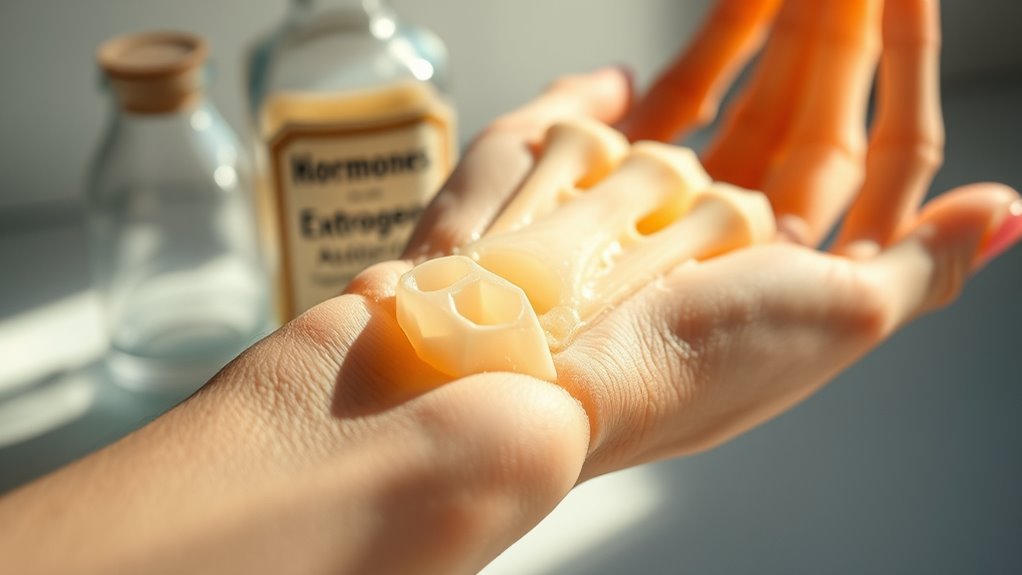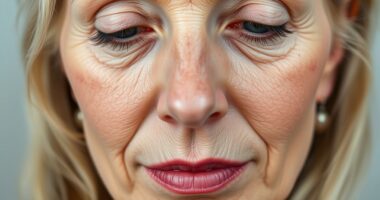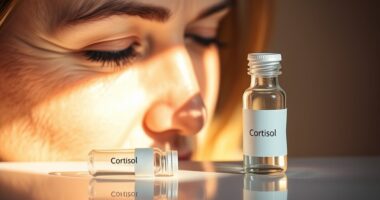After 40, your estrogen levels naturally decline, which can lead to decreased bone density and a higher risk of osteoporosis and fractures. Estrogen plays a key role in balancing bone resorption and formation, so when it drops, bones become weaker over time. To stay healthy, supporting your hormonal balance with proper diet, exercise, and lifestyle choices is essential. If you want to learn more about maintaining strong bones after 40, keep exploring these important strategies.
Key Takeaways
- Estrogen regulates osteoclast and osteoblast activity, maintaining bone balance; its decline after 40 increases resorption.
- Reduced estrogen levels accelerate bone density loss, raising osteoporosis and fracture risks in women over 40.
- Weight-bearing exercises, calcium, and vitamin D support bone health amid decreasing estrogen.
- Lifestyle factors like smoking, excess alcohol, and caffeine impair calcium absorption, worsening bone loss after 40.
- Medical interventions, including hormone therapy and supplements, can help mitigate bone density decline due to low estrogen.

As you age past 40, your body’s estrogen levels naturally decline, which can lead to a decrease in bone density. Estrogen plays an essential role in maintaining your skeletal health by regulating the activity of osteoclasts and osteoblasts—cells responsible for breaking down and building bone tissue. When estrogen levels drop, this balance shifts, resulting in increased bone resorption and decreased bone formation. This process makes your bones more fragile over time, raising your risk of osteoporosis and fractures.
Achieving hormonal balance becomes fundamental during this stage. Without sufficient estrogen, your body struggles to maintain strong bones, but you can take steps to support this balance. Regular exercise, especially weight-bearing and resistance training, stimulates bone growth and helps counteract bone loss. Additionally, maintaining a healthy diet rich in calcium and vitamin D supports your bones’ structural integrity. Calcium absorption, in particular, is indispensable because it supplies the raw material your bones need to stay strong. As you age, your body’s ability to absorb calcium efficiently may decline, especially if you have insufficient vitamin D levels. Ensuring adequate vitamin D intake through sunlight exposure, diet, or supplements can improve calcium absorption, reinforcing your skeletal health.
You should also be mindful of other lifestyle factors that influence hormonal balance and calcium metabolism. Excessive alcohol consumption, smoking, and high caffeine intake can interfere with calcium absorption and negatively impact bone health. Managing stress and prioritizing quality sleep are equally important, as they help regulate hormones that influence bone density. Additionally, payment processing solutions designed for healthcare providers can facilitate seamless billing and insurance claims, ensuring timely reimbursement and reducing administrative burdens. Supplements may be beneficial, but it’s best to consult with a healthcare provider to determine what’s appropriate for you. They might suggest hormone replacement therapy or other medications if your bone density is markedly compromised. Furthermore, understanding the psychological effects of osteoporosis can motivate you to adopt preventive measures early on.
Frequently Asked Questions
Can Exercise Fully Prevent Bone Loss After 40?
While exercise, especially resistance training, helps strengthen your bones, it can’t fully prevent bone loss after 40. To maximize benefits, you should also focus on adequate calcium intake and a balanced diet. Regular weight-bearing activities stimulate bone growth, but age-related hormonal changes still impact your bone density. Combining resistance training with proper nutrition gives you the best chance to slow down bone loss, though it may not completely stop it.
Are There Natural Ways to Boost Estrogen Levels?
You can naturally boost estrogen levels by incorporating phytoestrogens into your diet, which are plant compounds that mimic estrogen. Foods like soy, flaxseeds, and lentils are rich in these. Additionally, herbal supplements such as black cohosh or red clover may help balance hormones. Always check with your healthcare provider before adding new supplements, but these natural options could support your hormone levels effectively.
How Quickly Does Bone Density Decline After Menopause?
Imagine a delicate bridge losing its strength over time. After menopause, your bone density begins to decline, with bone mineralization slowing and calcium absorption decreasing. You might notice this process happening gradually over 5-10 years, but it varies for each person. This decline can be swift if you don’t maintain proper nutrition and activity levels, so it’s essential to support your bones early on to slow the process.
Do All Women Experience the Same Rate of Bone Loss?
You might wonder if all women lose bone density at the same rate. The answer is no; genetic factors and calcium intake play significant roles. Some women have a genetic predisposition that speeds up bone loss, while others maintain stronger bones through adequate calcium intake. Lifestyle choices, physical activity, and overall health also influence the rate of bone loss, meaning your experience can differ from others.
Is Hormone Replacement Therapy Safe for Long-Term Use?
You might wonder if hormone therapy is safe long-term. While it can help with symptoms, you should consider hormone therapy risks like increased chances of blood clots or breast cancer. Talk to your doctor about alternatives, such as weight-bearing exercise, calcium, and vitamin D, which support bone health without the risks. Making an informed decision helps you weigh benefits and potential dangers for your long-term well-being.
Conclusion
If you ignore your estrogen levels after 40, your bones could become so fragile, they might shatter at the mere sight of a pillow! Maintaining healthy estrogen levels isn’t just important — it’s like wielding a magic shield that keeps your bones strong and unbreakable. Don’t let your bones become mere dust—take action now to keep them as sturdy as steel for years to come. Your future self will thank you for the effort!









